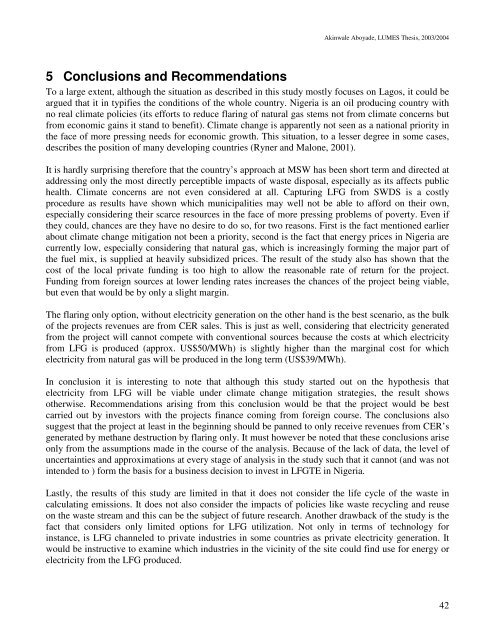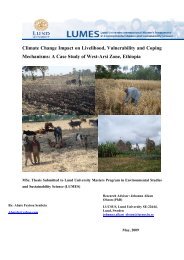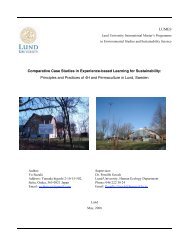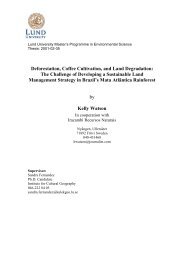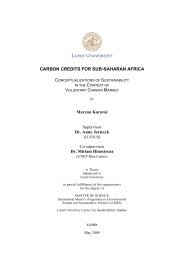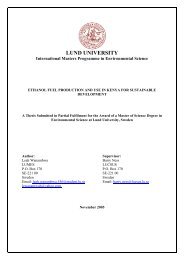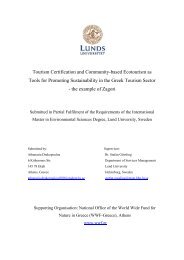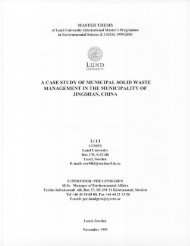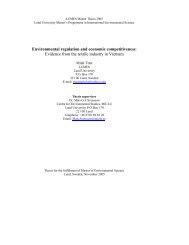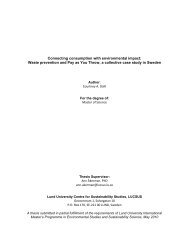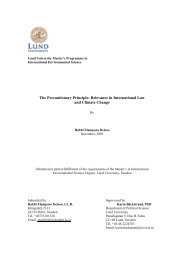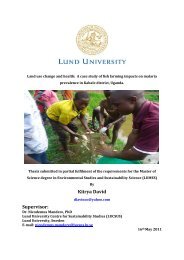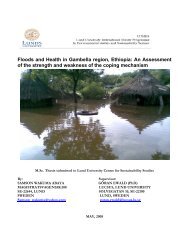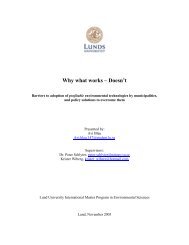Wale Aboyade's thesis - lumes
Wale Aboyade's thesis - lumes
Wale Aboyade's thesis - lumes
You also want an ePaper? Increase the reach of your titles
YUMPU automatically turns print PDFs into web optimized ePapers that Google loves.
Akinwale Aboyade, LUMES Thesis, 2003/2004<br />
5 Conclusions and Recommendations<br />
To a large extent, although the situation as described in this study mostly focuses on Lagos, it could be<br />
argued that it in typifies the conditions of the whole country. Nigeria is an oil producing country with<br />
no real climate policies (its efforts to reduce flaring of natural gas stems not from climate concerns but<br />
from economic gains it stand to benefit). Climate change is apparently not seen as a national priority in<br />
the face of more pressing needs for economic growth. This situation, to a lesser degree in some cases,<br />
describes the position of many developing countries (Ryner and Malone, 2001).<br />
It is hardly surprising therefore that the country’s approach at MSW has been short term and directed at<br />
addressing only the most directly perceptible impacts of waste disposal, especially as its affects public<br />
health. Climate concerns are not even considered at all. Capturing LFG from SWDS is a costly<br />
procedure as results have shown which municipalities may well not be able to afford on their own,<br />
especially considering their scarce resources in the face of more pressing problems of poverty. Even if<br />
they could, chances are they have no desire to do so, for two reasons. First is the fact mentioned earlier<br />
about climate change mitigation not been a priority, second is the fact that energy prices in Nigeria are<br />
currently low, especially considering that natural gas, which is increasingly forming the major part of<br />
the fuel mix, is supplied at heavily subsidized prices. The result of the study also has shown that the<br />
cost of the local private funding is too high to allow the reasonable rate of return for the project.<br />
Funding from foreign sources at lower lending rates increases the chances of the project being viable,<br />
but even that would be by only a slight margin.<br />
The flaring only option, without electricity generation on the other hand is the best scenario, as the bulk<br />
of the projects revenues are from CER sales. This is just as well, considering that electricity generated<br />
from the project will cannot compete with conventional sources because the costs at which electricity<br />
from LFG is produced (approx. US$50/MWh) is slightly higher than the marginal cost for which<br />
electricity from natural gas will be produced in the long term (US$39/MWh).<br />
In conclusion it is interesting to note that although this study started out on the hypo<strong>thesis</strong> that<br />
electricity from LFG will be viable under climate change mitigation strategies, the result shows<br />
otherwise. Recommendations arising from this conclusion would be that the project would be best<br />
carried out by investors with the projects finance coming from foreign course. The conclusions also<br />
suggest that the project at least in the beginning should be panned to only receive revenues from CER’s<br />
generated by methane destruction by flaring only. It must however be noted that these conclusions arise<br />
only from the assumptions made in the course of the analysis. Because of the lack of data, the level of<br />
uncertainties and approximations at every stage of analysis in the study such that it cannot (and was not<br />
intended to ) form the basis for a business decision to invest in LFGTE in Nigeria.<br />
Lastly, the results of this study are limited in that it does not consider the life cycle of the waste in<br />
calculating emissions. It does not also consider the impacts of policies like waste recycling and reuse<br />
on the waste stream and this can be the subject of future research. Another drawback of the study is the<br />
fact that considers only limited options for LFG utilization. Not only in terms of technology for<br />
instance, is LFG channeled to private industries in some countries as private electricity generation. It<br />
would be instructive to examine which industries in the vicinity of the site could find use for energy or<br />
electricity from the LFG produced.<br />
42


